
This is a list of notable events in music that took place in the year 1942.

This is a list of notable events in music that took place in the year 1944.
The year 1938 in film involved some significant events.
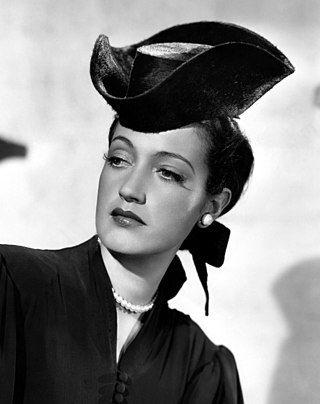
Dorothy Lamour was an American actress and singer. She is best remembered for having appeared in the Road to... movies, a series of successful comedies starring Bing Crosby and Bob Hope.
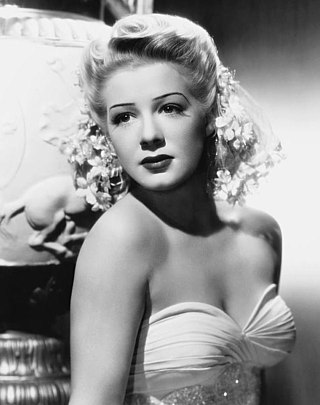
Betty Hutton was an American stage, film, and television actress, comedian, dancer, and singer. She rose to fame in the 1940s as a contract player for Paramount Pictures, appearing primarily in musicals and became one of the studio's most valuable stars. She was noted for her energetic performance style.
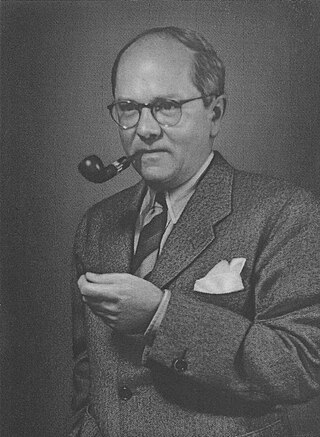
Richard Armstrong Whiting was an American composer of popular songs, including the standards "Hooray for Hollywood", "Ain't We Got Fun?" and "On the Good Ship Lollipop". He also wrote lyrics occasionally, and film scores most notably for the standard "She's Funny That Way".

The Hollywood Palace is an hourlong American television variety show broadcast Saturday nights on ABC from January 4, 1964, to February 7, 1970. Titled The Saturday Night Hollywood Palace for its first few weeks, it began as a midseason replacement for The Jerry Lewis Show, another variety show, which lasted only three months.

George E. Marshall was an American actor, screenwriter, producer, film and television director, active through the first six decades of film history.
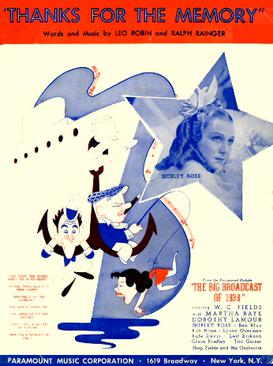
"Thanks for the Memory" (1938) is a popular song composed by Ralph Rainger with lyrics by Leo Robin. It was introduced in the 1938 film The Big Broadcast of 1938 by Bob Hope and Shirley Ross, and recorded by Shep Fields and His Orchestra featuring John Serry Sr. on accordion in the film and vocals by Bob Goday on Bluebird Records. Dorothy Lamour's solo recording of the song was also popular, and has led to many mistakenly believing over the years that it was she who sang the tune with Hope in the film.

Here Comes the Groom is a 1951 American musical romantic comedy film produced and directed by Frank Capra and starring Bing Crosby and Jane Wyman. Based on a story by Robert Riskin and Liam O'Brien, the film is about a foreign correspondent who has five days to win back his former fiancée, or he'll lose the orphans he adopted. Filmed from late November 1950 to January 29, 1951, the film was released in the United States by Paramount Pictures on September 20, 1951.

"By the Light of the Silvery Moon" or "By the Light of the Silv'ry Moon" is a popular love song. The music was written by Gus Edwards, and the lyrics by Edward Madden. The song was published in 1909 and first performed on stage by Lillian Lorraine in the Ziegfeld Follies of 1909. It was one of a series of moon-related Tin Pan Alley songs of the era. The song was also used in the short-lived Broadway show Miss Innocence when it was sung by Frances Farr.
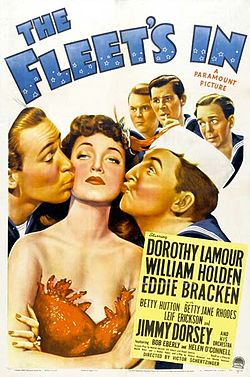
The Fleet's In is a 1942 movie musical produced by Paramount Pictures, directed by Victor Schertzinger, and starring Dorothy Lamour and William Holden. Although sharing the title of the 1928 Paramount film starring Clara Bow and Jack Oakie, it was not a remake. It was actually the second film version of the 1933 Kenyon Nicholson–Charles Robinson stage play Sailor, Beware!, enlivened with songs by Schertzinger and lyricist Johnny Mercer. The score, under the musical direction of Victor Young, includes the popular hits "Tangerine", and "I Remember You".
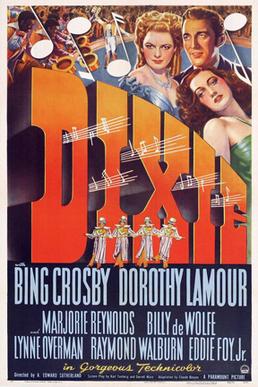
Dixie is a 1943 American biographical film of songwriter Daniel Decatur Emmett directed by A. Edward Sutherland and starring Bing Crosby and Dorothy Lamour. Filming in Technicolor, Dixie was only a moderate success and received mixed reviews. Contrary to rumor, it has not been withdrawn from circulation due to racial issues but is simply one of hundreds of vintage Paramount Pictures from the 1930s and 1940s now owned by Universal and not actively marketed; it was broadcast several times in the late 1980s on the American Movie Classics channel. The film produced one of Crosby's most popular songs, "Sunday, Monday, or Always".

Star Spangled Rhythm is a 1942 American all-star cast musical film made by Paramount Pictures during World War II as a morale booster. Many of the Hollywood studios produced such films during the war, with the intent of entertaining the troops overseas and civilians back home and to encourage fundraising – as well as to show the studios' patriotism. This film was also the first released by Paramount to be shown for 8 weeks.
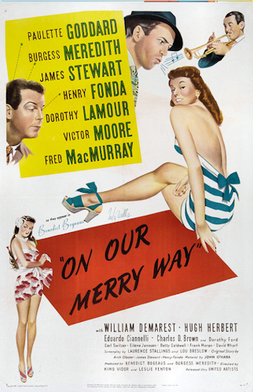
On Our Merry Way is a 1948 American comedy film produced by Benedict Bogeaus and Burgess Meredith and released by United Artists. At the time of its release, King Vidor and Leslie Fenton were credited with its direction, although the DVD lists John Huston and George Stevens, who assisted with one of the segments, as well. The screenplay by Laurence Stallings and Lou Breslow, based on an original story by Arch Oboler, is similar in style to that of Tales of Manhattan (1942), another anthology film made up of several vignettes linked by a single theme. The picture stars Paulette Goddard, Burgess Meredith, James Stewart, Henry Fonda, Harry James, Dorothy Lamour, Victor Moore and Fred MacMurray. It marks the first joint movie appearance of Stewart and Fonda, who play a pair of musicians in their section of the film.

Nick Fatool was an American jazz drummer.

Here Come the Waves is a 1944 American romantic comedy musical film directed by Mark Sandrich. It stars Bing Crosby and Betty Hutton.

Out of This World is a 1945 American romantic comedy film directed by Hal Walker and starring Eddie Bracken, Veronica Lake and Diana Lynn. The picture was a satire on the Frank Sinatra "bobby soxer" cult.
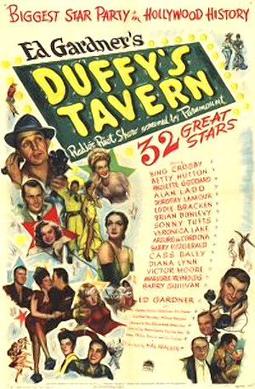
Duffy's Tavern is a 1945 American comedy film directed by Hal Walker and written by Melvin Frank and Norman Panama. The film stars Ed Gardner, Bing Crosby, Betty Hutton, Paulette Goddard, Alan Ladd, Dorothy Lamour, Eddie Bracken and Brian Donlevy. The film was released on September 28, 1945, by Paramount Pictures.
The Melody Top Theatre was a musical theatre located in Milwaukee, Wisconsin and featured performances in the round. The theatre that was originally built as a circus-style tent is now defunct.


















